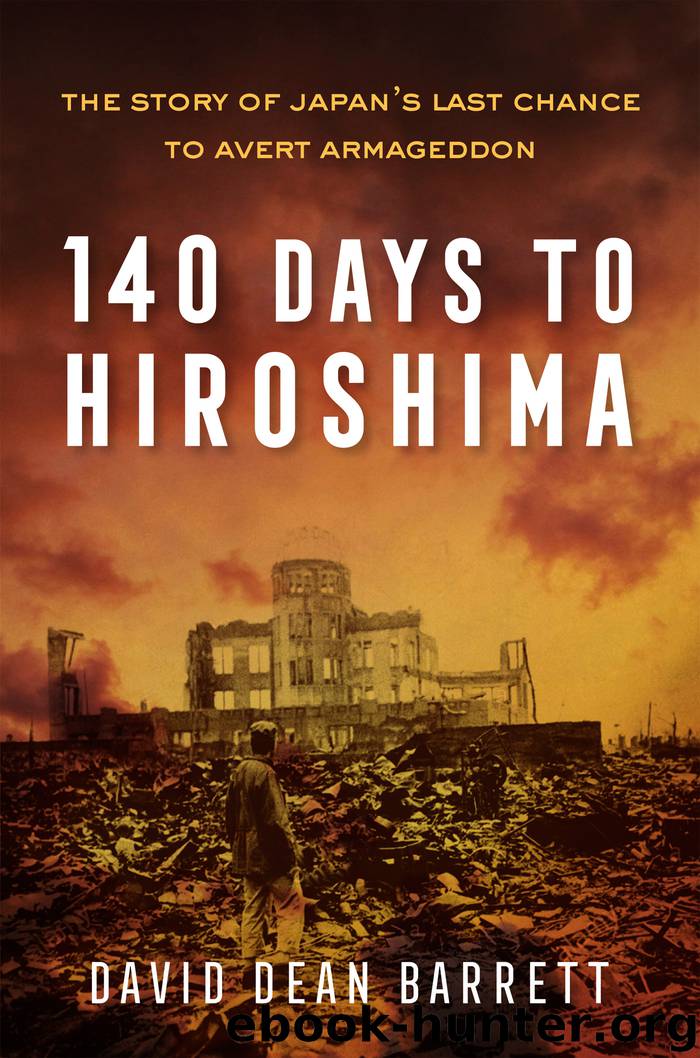140 Days to Hiroshima by David Dean Barrett

Author:David Dean Barrett
Language: eng
Format: epub
Tags: General Fiction
Publisher: Diversion Books
Published: 2020-01-23T16:00:00+00:00
9
A SHIFT OF POWER,
THE FIRST IMPERIAL INTERVENTION
August 9, 1945
3 Days After Hiroshima
The Soviet Union was now officially at war with Japan, and the culmination of the greatest conflict of the twentieth century was now clearly in the hands of a select group of men in Japan’s halls of power. These would be the critical final days and hours that diarists and historians would doggedly recount and research, so intensely that dialogue between Japan’s leaders can rather faithfully be reconstructed and readers of accounts like this one can be placed squarely in the middle of these crucial events. In addition to the diaries and memoirs of key figures, four crucial works and their primary sources provide a fly-on-the-wall perspective in the days that follow.
The first, Japan’s Longest Day, was penned by the fourteen members of The Pacific War Research Society, a group of Japanese historians who devoted years of their lives to interviewing eyewitnesses of the drama that unfolded during those historic days. Over one year alone, the Society interviewed and crosschecked the accounts of seventy-nine of the men who took part in the decision to surrender.
The second volume, told from the Japanese perspective, is John Tolland’s Pulitzer Prize-winning book The Rising Sun: The Decline and Fall of the Japanese Empire.
Japan’s Decision to Surrender, written by Robert J.C. Butow, a preeminent historian of US-Japan relations from 1941 to the end of the war in 1945, is another invaluable source. His book is still universally regarded as “the classic work” on the end of the Asia-Pacific War.
The fourth book was authored by Lester Brooks. Brooks served in the US Army in the Pacific during World War II and was stationed at Supreme Commander for the Allied Powers (SCAP) General Headquarters (GHQ), General Douglas MacArthur’s headquarters for the occupation. Brooks’ research for Behind Japan’s Surrender: The Secret Struggle That Ended an Empire included personal interviews he conducted in 1965 with thirty eyewitnesses. He also pulled from transcripts of 1965 interviews of other witnesses provided by the National Broadcasting Company (NBC); General MacArthur’s Military History Section, two volumes of unpublished “Statements of Japanese Officials on World War II”; “Interrogations of Japanese Officials” by USSBS immediately after Japan’s surrender; and the Tokyo Trials—the International Military Tribunal for the Far East, which lasted more than two years, from April 29, 1946, through November 12, 1948, and included testimony from nearly every significant figure in Japanese political and military life.
And so, with this cache of resources available, this author echoes the words of Lester Brooks, who wrote: “From these invaluable sources have come the actual words of the men who led Imperial Japan in its final days.”
IN THE JAPANESE CAPITAL, AT 8:00 a.m., an angry Tōgō arrived at the Prime Minister’s home in Koishikawa in north-central Tokyo to brief him on the Soviet declaration of war and the Red Army’s invasion of Manchuria. Tōgō demanded a meeting of the Supreme War Council, which had been postponed from the previous day, and exhorted Suzuki to stop the war at once.
Download
This site does not store any files on its server. We only index and link to content provided by other sites. Please contact the content providers to delete copyright contents if any and email us, we'll remove relevant links or contents immediately.
| Africa | Americas |
| Arctic & Antarctica | Asia |
| Australia & Oceania | Europe |
| Middle East | Russia |
| United States | World |
| Ancient Civilizations | Military |
| Historical Study & Educational Resources |
The Tale of Genji (unabridged) by Shikibu Murasaki(1035)
Japan by Edwin Reischauer(956)
The Complete Guide to Japanese Drinks by Stephen Lyman & Chris Bunting(933)
Shogun by James Clavell(875)
Native American in the Land of the Shogun: Ranald MacDonald and the Opening of Japan by Frederik L. Schodt(815)
The Pacific War by Robert O'Neill(803)
Japanese Notebooks by Igort(801)
Japanese Candlestick Charting by Steve Nison(759)
Shogun (The Asian Saga Chronology) by James Clavell(754)
Last Mission to Tokyo by Michel Paradis(751)
The Pillow Book by Sei Shonagon(730)
Bushido Explained by Alexander Bennett(728)
Ninja Fighting Techniques by Stephen K. Hayes(715)
The Dutch Encounter with Tokugawa Japan by Adam Clulow(713)
The Great Road by Smedley Agnes;(701)
Last Mission to Tokyo: The Extraordinary Story of the Doolittle Raiders and Their Final Fight for Justice by Michel Paradis(659)
Underground: The Tokyo Gas Attack and the Japanese Psyche by Haruki Murakami(658)
People Who Eat Darkness by Richard Lloyd Parry(654)
Comfort Woman by Maria Rosa Henson(649)
